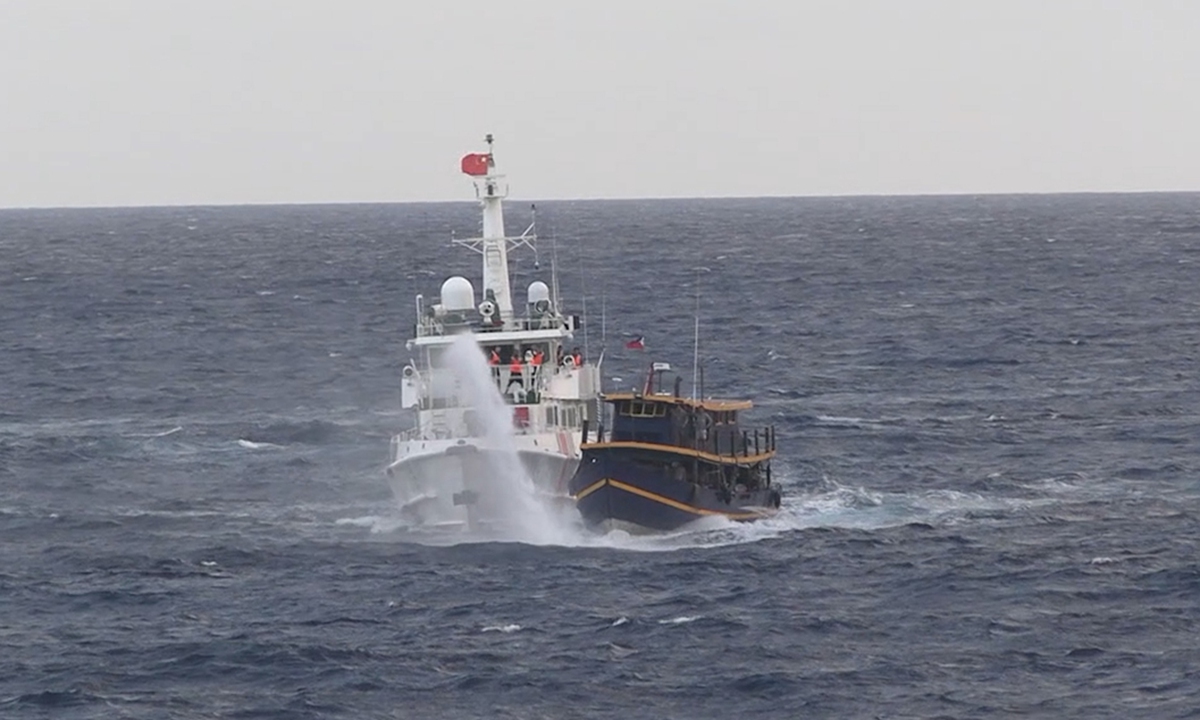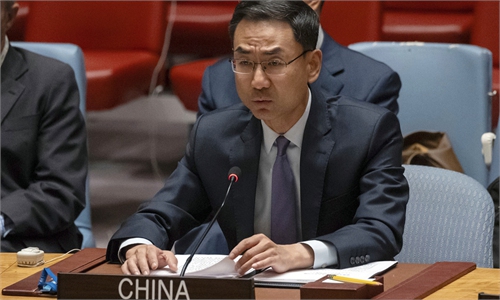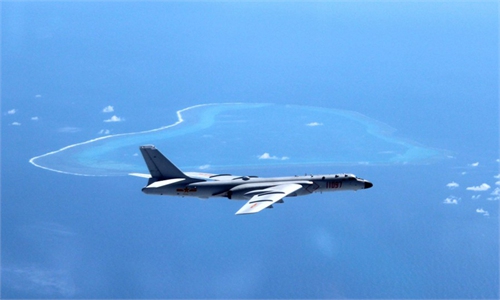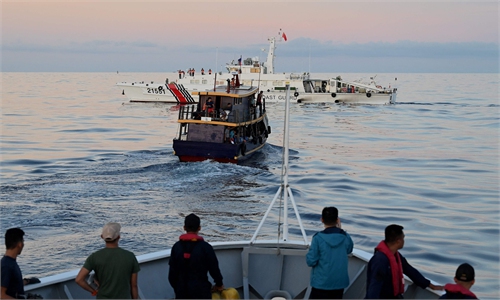Philippines urged to exercise caution, rationality in S.China Sea
Shadow dancer US fans flames from behind with Manila as its vanguard: expert

Disregarding warnings from the Chinese side, a Philippine vessel, the Unaiza May 1, makes an unprofessional and dangerous turn, and intentionally rams into a China Coast Guard ship in waters off China's Ren'ai Reef in the South China Sea on December 10, 2023. Photo: Screenshot from a video clip obtained by the Global Times
Form the prospect of entering a "golden era" to "standing at a crossroads," China-Philippines relations have been on a roller coaster in 2023 as the Philippines continues to challenge China's sovereignty by sending ships to intrude into the adjacent waters of China's Ren'ai Jiao (also known as Ren'ai Reef) in an attempt to deliver construction materials to repair and reinforce the illegally "grounded" military vessel.Following a recent phone conversation between Chinese and Philippine senior officials aimed at easing tensions, analysts said on Thursday that the Philippines' act of provocations by bringing external forces into the Asia-Pacific is an extremely dangerous move for Manila and regional stability, and the Philippines should not misjudge China's determination to safeguard its sovereignty in the South China Sea. At the same time, it should not doubt China's sincerity in resolving the issue through dialogue.
Chinese Foreign Minister Wang Yi on Wednesday urged the Philippine side to make the proper management of the current maritime situation a top priority during a phone conversation with Philippine Secretary of Foreign Affairs Enrique A. Manalo at the latter's request.
The severe difficulties facing China-Philippines relations right now are rooted in the fact that the Philippine side has changed its policy stance, reneged on the promises it has made, constantly provoked troubles at sea, and undermined China's legitimate and lawful rights, said Wang, also a member of the Political Bureau of the Communist Party of China Central Committee.
China is always committed to resolving differences through dialogue and consultation to jointly maintain maritime stability, Wang said.
He warned that if the Philippine side misjudges the situation, goes its own way, or even colludes with ill-intentioned external forces to continue stirring up trouble, China will defend its rights in accordance with law and respond resolutely.
Manalo, for his part, talked about the views of the Philippine side on the issue of Ren'ai Jiao, expressing the hope that differences can be managed in a way acceptable to both sides, so as to cool down tensions and prevent conflicts.
Manalo said the Philippine side is willing to strengthen dialogue with China in good faith, make good use of the bilateral communication mechanism on maritime issues, and jointly seek a solution to the issue.
The two sides agreed to hold a meeting of the Bilateral Consultation Mechanism on the South China Sea as soon as possible and actively create favorable conditions for it.
Wang Wenbin, a spokesperson of Chinese Foreign Ministry, said at a Thursday press briefing that China's position on maritime disputes with its neighbors remains unchanged.
"When it comes to maritime disputes with our neighbors, China's position is consistent and clear without any change. Our commitment to properly managing disputes through dialogue and consultation has not changed. Our willingness to work with the Philippines to implement the previously reached common understandings and agreements has not changed. Our policy of working with the Philippines and other ASEAN countries to safeguard peace and stability in the South China Sea has not changed," Wang Wenbin said.
Last but not least, our resolve to safeguard our sovereignty and legitimate rights and interests has not changed and will not change, said the spokesperson.
'Standing at a crossroads'
Although the two ministers agreed to strengthen dialogue and cool tensions on Wednesday, on the same day, Philippine Defense Secretary Carlos Teodoro said "only China believes in what they are saying," as "no country in the world" unequivocally supports China's claim to the whole of the South China Sea, according to media reports.
Noting that the bilateral relationship now stands at a crossroads, with its future yet to be decided, Wang Yi told his counterpart that the Philippine side must act with caution.
Instead of continuing in the wrong direction, the Philippine side should return to the right path as soon as possible, Wang Yi said.
Wang Yi's words also came against the backdrop of Philippine President Ferdinand Marcos Jr. calling for a "paradigm shift" in dealing with disputes.
Xu Liping, director of the Center for Southeast Asian Studies at the Chinese Academy of Social Sciences, told the Global Times it's possible for China-Philippines relations to ease in the future, but the key is whether the two sides can return to the traditional bilateral dialogue and consultation mechanism, instead of turning bilateral issues into multilateral ones and complicating the situation.
Marcos's comment, according to Xu, is a tentative move against China, and an attempt to win sympathy from other countries. But regional countries may not support the Philippines, as Manila's provocative approach will only harm regional stability, Xu said.
Gu Xiaosong, dean of the ASEAN Research Institute at the Hainan Tropical Ocean University, said there are two paths for Manila to choose from. One is jointly to manage differences with China, and take actions to maintain peace and stability in the South China Sea. The other path is to continue challenging China's territorial sovereignty, which goes against the common interests of both countries and the region.
In fact, the common interests between China and the Philippines far outweigh the differences, and a good relationship with China is conducive to the Philippines' own development, said Gu.
For the Philippines, developing its economy and addressing livelihood issues requires massive investment and infrastructure projects. China has a huge market demand for agricultural products and processed goods, which can allow the Philippines to increase its exports, Gu noted.
External interference
According to Zhu Feng, director of the Institute of International Studies at Nanjing University, one element behind the recent spats in the South China Sea is Marcos' efforts to salvage his government's dropping approval rate, as a tough stance against China on the Ren'ai Jiao question is regarded as important political capital for Marcos, despite the fact it also brings risks to bilateral ties.
Zhu pointed out that another factor affecting regional security and cooperation is the intervention of external forces.
Just as the Chinese and Philippine foreign ministers exchanged their views, a new radar system built by Japan was installed and started operations on Wednesday on the northwestern coast of the largest island in the Philippines, which was believed to be "tracking China's moves," according to media reports.
The US, the shadow dancer inciting disputes, has constantly fanned flames, bringing the Philippines to the front line to contain China. The Philippines is also trying to make use of "support" from external forces as a bargaining chip to gain leverage against China, Xu said.
But this won't help solve the problem or serve the Philippines' national interests, Xu said, "although the possibility of a head-on conflict between China and the Philippines is tiny, Manila should not misjudge Beijing's determination to safeguard its sovereignty in the South China Sea, and real conflict with China would be unaffordable for the Philippines."
According to Zhu, the US is anticipated to continue deepening and expanding its diplomatic, military and security interventions in the South China Sea with the Philippines as its vanguard, which means that in order to prevent the situation from getting out of control, dialogue between China and the US is equally important.
The US and Japan have strategic needs to manipulate the Philippines into instigating tensions in the South China Sea. But they will throw the Philippines under the bus when they need to, leaving Manila to bear the tragedy on its own, analysts said.





